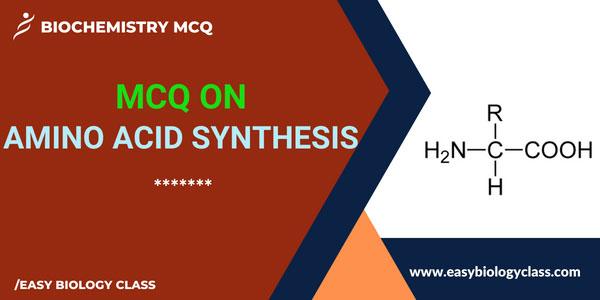The Michaelis-Menten equation characterizes the enzyme kinetics. It relates reaction rate (V) to substrate concentration (S), incorporating constants: Vmax (max rate) and Km (substrate conc. at half Vmax). As S increases, V approaches Vmax. Km reflects enzyme-substrate affinity. This equation aids in understanding enzyme behaviour and designing efficient enzymatic processes. […]
Continue ReadingCategory Archives: Biochemistry
easybiologyclass tutorials in biochemistry
MCQ on Enzyme Kinetics
Enzyme kinetics studies the speed of enzyme-catalyzed reactions. It explores factors influencing reaction rates: substrate concentration, enzyme activity, and temperature. Michaelis-Menten equation models this, defining Vmax (maximum rate) and Km (substrate concentration at half Vmax). Enzyme inhibitors also impact kinetics, crucial in understanding various biological processes and drug development. Please […]
Continue ReadingMCQ on Amino Acid Biosynthesis
Amino acid biosynthesis is a complex cellular process where organisms synthesize amino acids, the building blocks of proteins. It involves intricate pathways, often regulated by feedback mechanisms, to ensure balanced amino acid production. These pathways are crucial for sustaining life, growth, and diverse physiological functions across all living organisms. With […]
Continue ReadingMCQ on Photophosphorylation (Light Reaction)
Photophosphorylation is a biological process in photosynthesis where light energy is absorbed by chlorophyll in plant cells and converted into chemical energy. This energy is used to add a phosphate group to ADP, creating ATP, a crucial molecule for cellular activities. Photophosphorylation occurs in the thylakoid membrane of chloroplasts, driving […]
Continue ReadingDifference between Monoclonal and Polyclonal Antibodies
Monoclonal Antibodies Monoclonal antibody (mAb) is an antibody produced from a cell lineage made by cloning a unique white blood cell. They are identical immune proteins (antibodies) created in the lab to target specific antigens. Monoclonal antibodies are produced by fusing a single type of antibody-producing cell with a cancerous […]
Continue Reading




